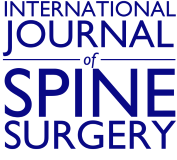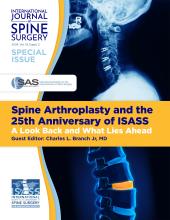ABSTRACT
Background One of the most frequent complications of invasive lumbar spine surgery is postoperative surgical site infections (SSIs). Although there are absolute criteria for surgical intervention (progressive neurologic deficit, sepsis, failure of medical management), the treatment of routine, uncomplicated SSIs remains somewhat unclear. The purpose of this study was to evaluate the outcome of a series of patients with postoperative surgical site infections who were treated with or without surgical intervention. The primary clinical outcome was the assessment of whether medical management alone would be sufficient to eradicate the infection.
Methods A retrospective review of consecutive patients who underwent lumbar surgery complicated by spine infection between 2011 and 2017 was performed in order to determine what factors, if any, resulted in the need for additional surgical management. Medical records were reviewed for various demographic (e.g., age), clinical (e.g., organism), and surgical (e.g., presence of instrumentation) factors. A regression analysis was performed to identify what variables significantly increased the risk for SSI.
Results During the 6-year period studied, a total of 74 patients met the inclusion criteria and were included in the study. There were 13 patients who failed medical management and required additional surgical management, which included irrigation and debridement. Thus, overall, medical management alone was effective in 82% of patients. In the final multivariate logistic regression analysis model, revision primary surgery had the strongest association with SSI that would require a washout. In addition, diabetes had a strong association with the occurrence of an infection.
Conclusions Identification of risk factors associated with the need for additional surgical management may benefit from aggressive antibiotic therapy to reduce the likelihood of reoperation. Clinicians should be aware of the identified risk factors, which may help with postoperative management in at-risk individuals
Footnotes
Disclosures and COI: The authors received no funding for this study and report no conflicts of interest.
- ©International Society for the Advancement of Spine Surgery







